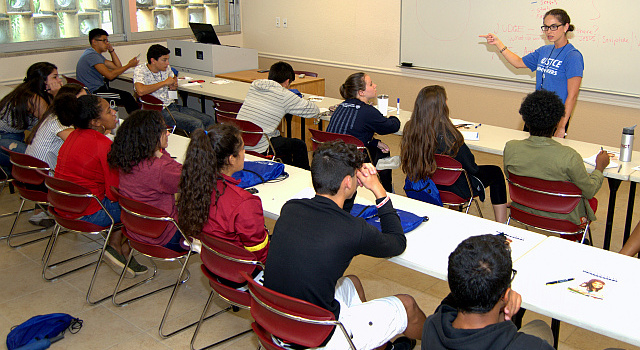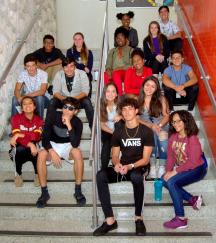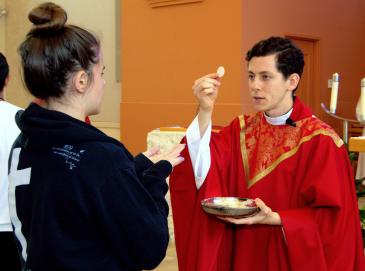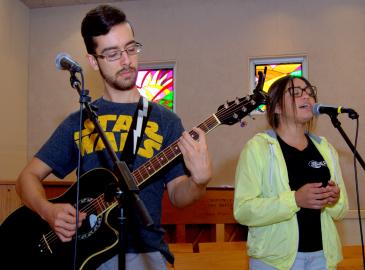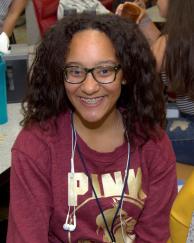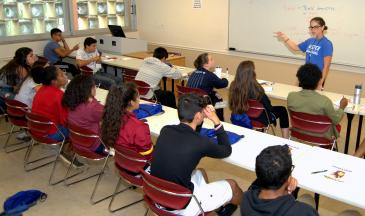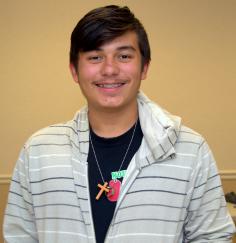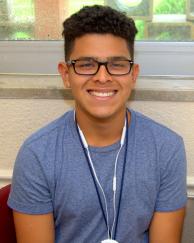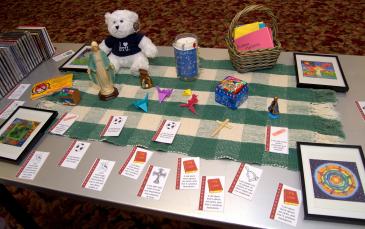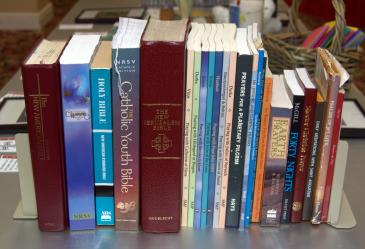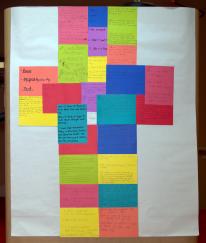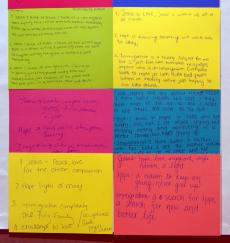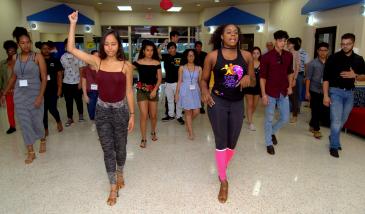By Jim Davis - Florida Catholic
Photography: Jim Davis | FC
MIAMI GARDENS | David Montealegre knew what to expect at Catholic retreats -- mainly lectures about God and how to be humble, he said.
Then he spent a week at STU Impact -- with its head-on approach to current events and Catholic social teaching -- and his jaded notions vanished.
"One word: Whoa," said David, 16, at the end of the weeklong program at St. Thomas University. "The counselors didn’t say, 'You're going to learn about Jesus.' They said, 'You're going to learn about yourself.' I actually got into it."
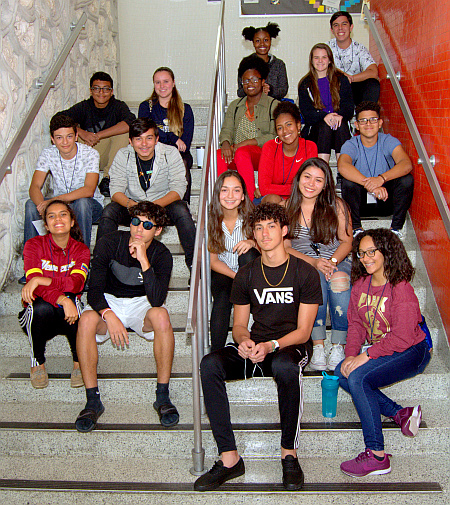
Photographer: Jim Davis
Sixteen teens from South Florida high schools took part in STU Impact, a weeklong program at St. Thomas University.
The third annual Impact, using a $500,000 Lilly grant, took place June 23-30. The 16 teenagers, from South Florida high schools, talked to farmworkers and cleaned up a beach. They also learned about the environment, Catholic social teachings and the Bible -- all with the theme of connections among them all. And they discussed how to live the faith via their own service projects.
"I love the program, it's very life-giving for me," said Jennifer Kryszak, project director of Impact and a theology professor at STU. "It's inspirational to see what they come up with."
At the Coalition of Immokalee Workers in southwest Florida, the students got an object lesson: a 32-pound bucket of tomatoes. A speaker invited them to pick it up.
"I picked it up one inch," said Georgina Torres, 15. "Then I put it down."
She was then shocked to hear the pickers have to run with the buckets on a shoulder to empty them in a bin -- and they get only 50 cents for each bucketful. And they often work 12 to 14 hours a day.
"It made me think of the struggles of my dad -- repairing windows, just to put food on the table," said Georgina, a member of Corpus Christi parish in Miami.
LEARNING FROM TRASH
More insights awaited the teens at the Von D. Mizell-Eula Johnson State Park, Dania Beach. Armed with rubber gloves, the youths combed the sandy beach, filling trash bags with jugs, ropes, wood, plastic water bottles and other carelessly discarded items.
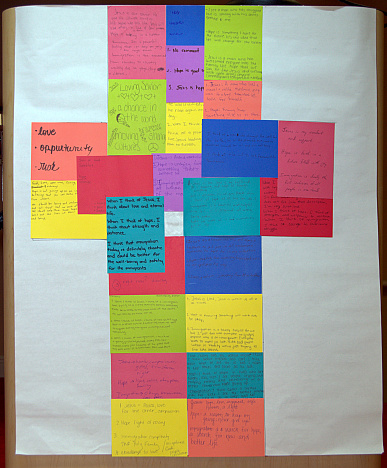
Photographer: Jim Davis
Students attending STU Impact at St. Thomas University wrote their thoughts on Jesus, hope and immigration, then put them in the shape of a cross.
Nathan Bonet, 17, recalled a park ranger picking up a handful of seaweed, allowing tiny creatures to fall out. It was a vivid lesson in ecology, he said.
"Fish eat those creatures, and we eat the fish," said Nathan, of Annunciation Church, West Hollywood. "And when we put plastic in the ocean, it comes back to us. Catholic social teaching isn't just about the human community -- the whole earth is a community."
What most bothered Georgina were the 15 plastic water bottles she picked up. "I use five water bottles a day," she said. "I don’t value the environment as I should."
Mary Carter Waren, a theology professor at STU, offered an introduction to Catholic social teaching. Her five main points: All people are created in the image of God; all life is sacred; Jesus is the fullest revelation of God; we are meant to live in community; and God works in and through history, not apart from it.
Several young people remarked on a documentary, "Bad Hombres," about a trek of immigrants to the U.S. border. They learned about hardships the people endured -- hunger, thirst, beatings, foot injuries -- just to reach America.
"I saw my grandmother in it -- the struggle she went through," said Kluivet Suquino, 16, a member of Corpus Christi, whose family came from Nicaragua. "I don’t want others to go through that."
What struck Nathan Bonet were the smiles on the immigrants' faces as they were interviewed at the border. "They were so happy just to get here, to make a new life."
'THEY'RE JUST LIKE US'
The documentary rocked the view of Arianna Martinez, 17, of Our Lady of the Lakes Church in Miami Lakes. "I thought immigrants were just criminals. But they're really just like us. They want freedom, and they care for their children."
Waren said she was impressed with how well the students grasped the social message of Catholicism.
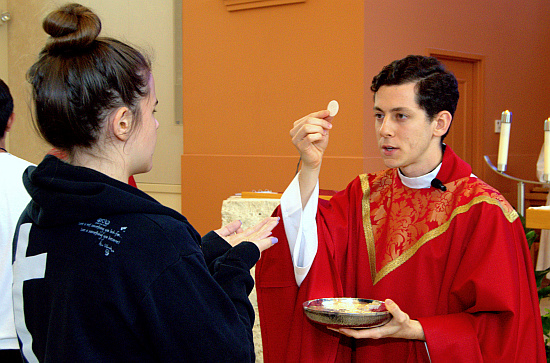
Photographer: Jim Davis
Father Alex Rivera administers the Eucharist at St. Thomas University during its STU Impact program.
"These kids are simply amazing for their depth of understanding of the issues," she said. "It gives me hope for the future. And hope is in very short supply."
The very act of staying on campus was a learning experience for these high schoolers. Although they hailed from 15 nations -- from Canada to Cuba to Guyana to Venezuela to Ireland -- they quickly made friends.
It was an eye opener for Kluivet Suquino, or Kly, as he likes to be called. An avowed introvert, he was skeptical about rooming with three other young men; then he found they shared interests in sports, music and other topics.
"I didn’t think I would get along with people that quickly," he said. "Now it's the last day, and I'll be sad to leave." He said he plans to organize a group chat to keep touch online.
Nor did Impact neglect spirituality. The teens recited the ancient Our Father and the Nicene Creed. They observed Adoration, daily Mass and the Benedictine devotion known as Lectio Divina.
They even devised some devotions themselves, using an armload of books provided by Jennifer Kryszak. Before a multicultural festival, they prayed under the flags of several nations in STU's law school. They also wrote on colored slips their ideas of "Who is Jesus," "What is Hope" and "What is Immigration." Then they pasted them in the shape of a cross.
'FIND YOUR PASSION'
The program counselors prodded the students to start thinking about how they could influence their personal worlds.
"Find your passion and don’t give up," said August Laino, a theology teacher at Archbishop Edward A. McCarthy High School in Southwest Ranches. "If a parish isn't interested, maybe you can help in some other parish."
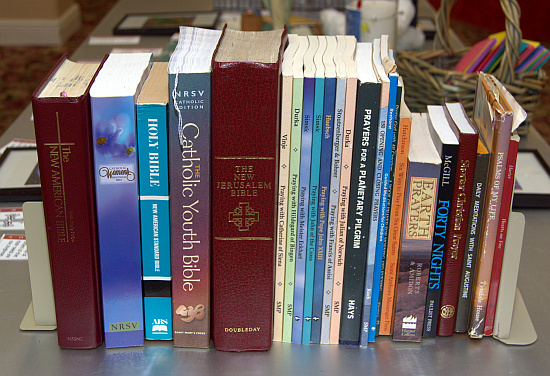
Photographer: Jim Davis
Program director Jennifer Kryszak supplied an armload of books for students to use in preparing devotions during STU Impact at St. Thomas University.
He and Jane Curry, who teaches theology at St. Thomas Aquinas High School in Fort Lauderdale, promised to be available for advice and guidance. They also warned the youths not to be discouraged if they meet resistance.
"Sometimes you think you need thousands of people to make a difference � [but] what you do matters in your community," Curry said.
She quietly added, almost as a mantra: "You can do this. You can do this. You can do this."
David Montealegre said he already knew his vocation: "Take care of people you hold dear. For me, that's family and friends. I want to be attentive to their problems. Whenever they're in pain or in need, I'm right there for them."
For Arianna Martinez, 17, her mind turned toward a vocation of volunteering at an animal shelter. "I love animals; I'd like to become a veterinarian," she said.
The youths may have left the STU campus, but they’ll be back. In the fall, they’ll have a chance at a group project, probably in a school near the university. Also planned is a reunion in February, when they'll report on service projects during the year.
Kryszak drew encouragement from comments at the final reception. "They said the program won't end with the week; they'll take it with them and keep living the lessons in their everyday lives.
"This reminds me why I love teaching so much -- watching them reflect and share during the week," she added. "They realized the ways we're connected with each other, and that those connections are the ways in which we can serve God."
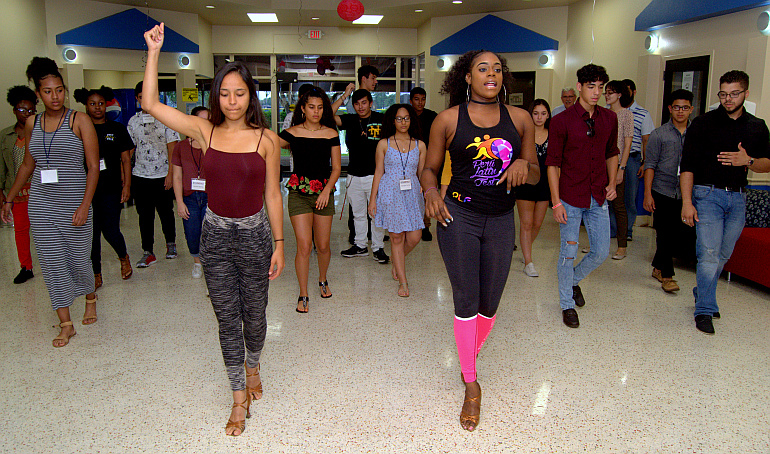
Photographer: Jim Davis
A multicultural festival finished up STU Impact week at St. Thomas University. Teaching salsa dance are Rebecca Sagarnaga, left, and Stella Azerot.
